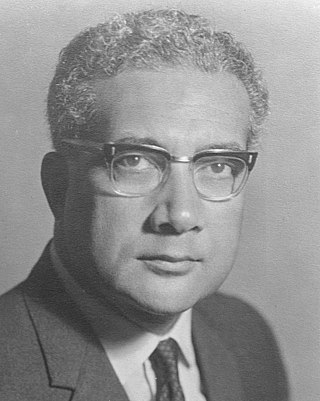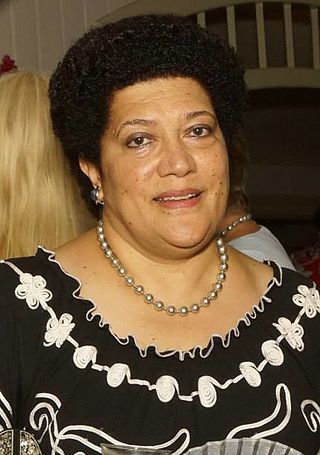George Speight, also known by his pseudonym Ilikimi Naitini, is a Fijian businessman and politician who was the leader of the 2000 Fijian coup d'état, in which he and rebel soldiers from Fiji's Counter Revolutionary Warfare Unit seized the Fijian Parliament and held Prime Minister Mahendra Chaudhry and 35 other MP's hostage from 19 May 2000 to 13 July 2000. He was convicted of treason in February 2002 and served a sentence of life imprisonment until receiving a presidential pardon on 18 September 2024.

RatuSir Kamisese Mara, was a Fijian politician who served as Chief Minister from 1967 to 1970, when Fiji gained its independence from the United Kingdom, and, apart from one brief interruption in 1987, as the first Prime Minister from 1970 to 1992. He subsequently served as president from 1993 to 2000.

Adi Koila Mara Nailatikau is a Fijian lawyer, who has served as a diplomat and politician. She was also First Lady of Fiji from 2009 until 2015, as the wife of Ratu Epeli Nailatikau, the President of Fiji.

Sitiveni Ligamamada Rabuka is a Fijian politician, sportsman, and former soldier who has been serving as Prime Minister of Fiji since 24 December 2022. He was the instigator of two military coups in 1987. He was democratically elected as Prime Minister of Fiji, serving from 1992 to 1999, and again in 2022, leading a three-party coalition. He also served as Chairman of the Great Council of Chiefs from 1999 to 2001, and later as Chairman of the Cakaudrove Provincial Council from 2001 to 2008.
RatuTevita Momoedonu was a Fijian politician who served as the fifth Prime Minister of Fiji twice – each time extremely briefly. Both appointments were to get around constitutional technicalities; his first term of office – on 27 May 2000 lasted only a few minutes. His second term – from 14 to 16 March 2001 was for two days. He subsequently served his country as Ambassador of Fiji to Japan. Using his chiefly title of "Taukei Sawaieke", he later led pushed for the Yasana of Ba to secede from the Burebasaga and Kubuna Confederacies to form their own fourth confederacy under the Tui Vuda, Ratu Josefa Iloilo, who died in 2011.
Ratu Jope Naucabalavu Seniloli was a Fijian chief who held the title of Turaga Taukei Naua and who served as Fiji's vice-president from 25 March 2001 to 29 November 2004, when he was forced to resign following his conviction for treason on 6 August 2004, and the rejection of his appeal early in November.
Fiji Week was a week of prayer meetings and multicultural programmes that took place the week of 4–11 October 2004. Organized at a cost of US$410,000 by a multiracial national committee chaired by the Prime Minister, Laisenia Qarase, Fiji Week was intended to foster reconciliation among Fiji's diverse ethnic communities, especially native Fijians and Indo-Fijians, whose mutual rivalry for political power has dominated Fijian politics for the last generation, and whose relationship has been especially strained since the overthrow of the Indo-Fijian-led government of Mahendra Chaudhry by ethnic Fijian nationalists in the Fiji coup of 2000. Organizers of Fiji Week hoped that it would help to bring about a sense of closure to those events, but the controversy that it generated made this appear difficult to achieve.

The Conservative Alliance was a right-wing political party in Fiji, and a member of the ruling coalition government. It was commonly known as the CAMV, a combination of the initials of its English and Fijian names. At its annual general meeting on 17 February 2006, the party voted to dissolve itself and merge with its coalition partner, the Soqosoqo Duavata ni Lewenivanua (SDL). The President of the party at the time of its dissolution was Ratu Tanoa Cakobau, a Bauan chief, while Ratu Josefa Dimuri served as General Secretary. For legal reasons, Parliamentary members of the disbanded party maintained a separate caucus in the House of Representatives, under the leadership of Ratu Naiqama Lalabalavu, until the end of the parliamentary term, on 27 March 2006.

The Fijian Association Party (FAP) is a former political party in Fiji. It played a significant role in Fijian politics throughout the 1990s but lost all of its seats in the House of Representatives in the parliamentary election of 2001.

The Fiji coup d'état of 2000 was a civilian coup d'état by hardline i-Taukei nationalists against the elected government of an Indo-Fijian Prime Minister, Mahendra Chaudhry on 19 May 2000. This was followed by an attempt on 27 May by President Ratu Sir Kamisese Mara to assert executive authority, and then by a military coup on 29 May by Republic of Fiji Military Forces Commander Commodore Frank Bainimarama.
Since attaining independence from the United Kingdom on 10 October 1970, Fijian history has been marked by exponential economic growth up to 1987, followed by relative stagnation, caused to a large extent by political instability following two military coups in 1987 and a civilian putsch in 2000. This was followed by another military coup in 2006. Rivalry between indigenous Fijians and Indo-Fijians, rather than ideological differences, have been the most visible cleavage of Fijian politics. Later in 2020, Fiji was hit by the global COVID-19 pandemic, which affected the economy and the daily lives of the people.
AdiAteca Moceiwaqa Mara Ganilau was a Fijian public figure and the eldest daughter of the former Prime Minister and President, the late Ratu Sir Kamisese Mara. Later in life she made many statements to the press about her family and the government.
Mohammad Apisai Vuniyayawa Tora was a Fijian politician, soldier, and trade unionist. As a labour leader, he was a fighter for dock workers. As a soldier, he served in Malaya and later served as President of the Ex-Servicemen's League.
Andrew Charles Hughes was an Australian police officer of the Australian Federal Police (AFP) who served as the Chief Police Officer (CPO) for the Australian Capital Territory (ACT) and the Head of the United Nations Police Division. The CPO position is similar to the role of Australian Commissioners of Police, that is, the chief executive of the ACT Policing component of the AFP. ACT Policing forms one of the larger operating components of Australia's national policing agency, the Australian Federal Police. He was also Commissioner of Police in Fiji from 2003 to 2006. Hughes died of bowel cancer in 2018, aged 62.

The tension between Fiji's government and military forces, which had been simmering for more than two years, appeared to escalate in late December 2005. Tension between the government and the military had been simmering throughout the year, with Commodore Bainimarama and other military officers making strongly worded public statements opposing certain government policies, including the early release from prison of persons implicated in the Fiji coup of 2000, and the government's promotion of controversial legislation to establish a Commission with the power to grant amnesty to perpetrators of the coup.
Isikia Rabici Savua was a senior Fijian diplomat who had a distinguished career in the military and police forces before taking up his last post as Ambassador and Permanent Representative to the United Nations on 4 March 2003.

The crisis that saw a virtual breakdown in relations between Fiji's government and military forces in late 2005 and early 2006, generated fears of civil unrest and even a military coup. The dismissing of Lieutenant Colonel Jone Baledrokadroka, the Acting Land Force Commander, for alleged insubordination on 12 January 2006 was coupled with unusual deployments of troops and naval vessels. Both before and after it was resolved on 16 January with a truce brokered by Acting President Ratu Joni Madraiwiwi, the crisis generated a great deal of comment.
Joseph Browne is a Fijian civil servant, who was Official Secretary to the late President, Ratu Sir Kamisese Mara, prior to Mara's possibly forced resignation during the insurrection which deposed the constitutional government in 2000. He had first been employed by Mara in 1985 when the latter was still Prime Minister, and had remained with him through the various offices he held, including the Vice-Presidency and Presidency. He is now the head of the Immigration Department.

Republic of Fiji Islands v Prasad is a 2001 landmark decision of the Court of Appeal of Fiji which upheld the 1997 Constitution of Fiji in the aftermath of the 2000 Fijian coup d'état. The court agreed with the previous High Court of Fiji ruling that the constitution had not been overturned and that Parliament had not been dissolved, but only prorogued. It also found that the office of President of Fiji had only become vacant in December 2000 after Kamisese Mara resigned following the High Court ruling.






